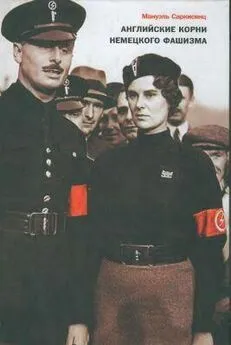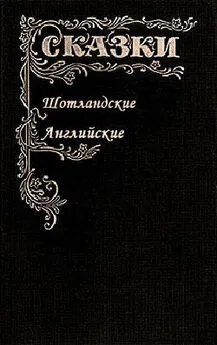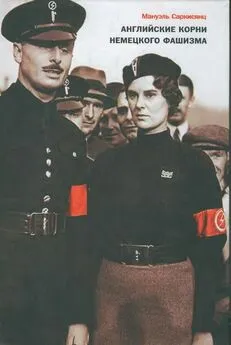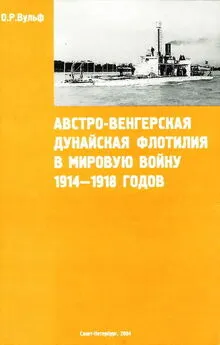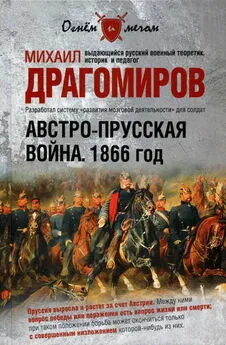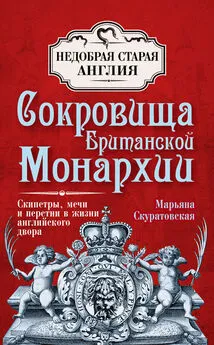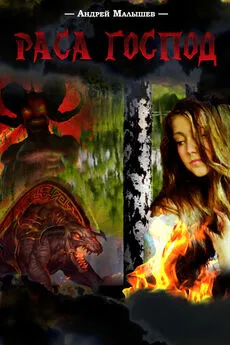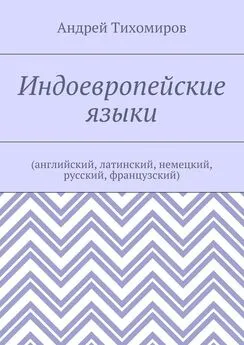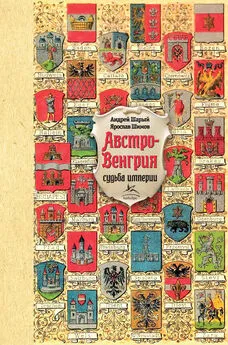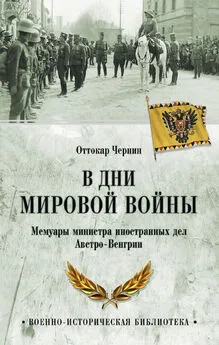Мануэль Саркисянц - Английские корни немецкого фашизма: от британской к австро-баварской «расе господ».
- Название:Английские корни немецкого фашизма: от британской к австро-баварской «расе господ».
- Автор:
- Жанр:
- Издательство:неизвестно
- Год:неизвестен
- ISBN:нет данных
- Рейтинг:
- Избранное:Добавить в избранное
-
Отзывы:
-
Ваша оценка:
Мануэль Саркисянц - Английские корни немецкого фашизма: от британской к австро-баварской «расе господ». краткое содержание
Мануэль Саркисянц (р. 1923, Баку) — известный историк и социолог, исследователь религиозных истоков народнического социализма России, Латинской Америки, Юго-Восточной Азии.
В данной книге излагается совершенно новый взгляд на происхождение немецкого фашизма. М. Саркисянц доказывает, что многие истоки идей Гитлера кроются в имперской политике и идеологии Англии. Автор последовательно показывает, как колониальная политика Англии, ее имперские амбиции, отношение к расовому вопросу, принципы воспитания и образования повлияли на формирование идей Гитлера. Подробно рассказано об идеализации гитлеровского Рейха в консервативном истеблишменте Великобритании, об участии англичан во Второй мировой войне на стороне Германии. Автор анализирует также принципиальные различия в теоретических и практических подходах британских и германских расистов, обусловивших столь разную судьбу и оценку соответствующих исторических феноменов.
Английские корни немецкого фашизма: от британской к австро-баварской «расе господ». - читать онлайн бесплатно полную версию (весь текст целиком)
Интервал:
Закладка:
1425
1059. Thost, Als Nationalsozialist in England (Munchen, 1939), S. 322; Bunting (1995), pp. 278, 15, 299, 304, 260, XXX, 238, 81; Asa Briggs, The Channel Islands. Occupation and Liberation 1940–1945 (London, 1995), p. 45.
1426
1060. Captain Maule Ramsay, The Nameless War, p. 69.
1427
1061. H. Sundernann, Alter Feind — was nun? (Leoni, 1955), S. 7, 70f, 205.
1428
1062. Klaus Hildebrand, Das vergangene Reich (wie Anm. 1085), S. 759; Thomas Carlyle "The Nigger Question" 1948: Miscellaneous Essays, Vol. IV (London, 1899), p. 375.
1429
1062a. O. D. Schuddekopf, Revolutions of our Time. Fascism (New York, 1973), p. 17, 171; Gerwin StrobI, The Germanic Isle. Nazi Perceptions of Britain (Cambridge, 2000), p. 87; K. D. Bracher, "…Letters to the NSDAP… Eisenach 1939–1940": Journal of Modern History, LXVIII, Nr. 4 (Dezember 1996), S. 903, with reference to Dietrich Orlow, History of the Nazi Party (Pittsburgh, 1973), p. 38; H. Rauschning, Revolution des Nihilismus (Ausgabe von 1964), S. 87f, 96, angefuhrt von Th. Schieder, Rauschnings Gesprache mit Hitler als Geschichtsquelle = Rheinisch-Westfalische Akademie der Wissenschaften, Vortrage, G 179 (1971), S. 56; Friedrich Doucet, Im Bannedes Mythos. Psychologie des Dritten Reiches (Esslingen, 1979), S. 203f; Иванов-Разумник. История русской общественной мысли. Индивидуализм и мещанство. Т. I. СПб., 1911. С. 18; см. также: Пути революции. Берлин, 1923. С. 8–9.
1430
1062b. Hermann Marcus, Der Spiesserstaat (Hamburg, 1977), S. 189; Klee & Dressen "Gott mit uns". Deutscher Vernichtungskrieg im Osten (Frankfurt, 1989), S. 39: Tagesbefehl des Generalfeldmarschalls von Reichenau vom 28. Oktober 1941. Vgl. E. Sarkisyanz, Russland und der Messianismus des Orients (Tubingen, 1955), S. 199, Fussnote 14.
1431
1062c. A. Glucksmann, Die Meisterdenker (Rheinbeck, 1978), S. 45; Struve, Elites (as reference 190), p. 458.
1432
1062d. H. Hartle, Alfred Rosenberg, Grossdeutschland (1970), S. 238; De Slade, p. 123; Eckenhard Struhldreher ("Leibstandarte" of the SS), in the German Television, MDR, 21. July, 1999, at 9 p. m.
1433
1062e. Seymour Lipset, "Fascism as extremism of the Center", in: Gilbert Allardyce (Editor), The place of Fascism in European history (Englewood Cliff, New Jersey, USA, 1971), p. 113.
1434
1062f. Cf. Gisela Lebzelter, Political Antisemitism in England 1918–1939, p. 174.
1435
1062g. Charles Dilke, Greater Britain (London, 1869), pp. 223, 564.
1436
1062h. Gerwin Strobl, The Germanic Isle. The Nazi perception of Britain (Cambridge, 2000), pp. 90ff: Hitler's Table Talk of 22. August, 1942.
1437
1063. Hermann Rauschning, Gesprache mit Hitler (Zurich, 1940), S. 116f; Раушнинг. С. 102.
1438
1064. Reichskolonialamt, Die Behandlung der eingeborenen Bevolkerung in den Kolonialbesitzungen Deutschlands und Englands (Berlin, 1919), S. 73ff, 82.
1439
1065. Rede des Reichskommissar Erich Koch auf \ersammlung der NSDAP in Kiew am 5. Marz 1943: Ernst Klee & Willi Dressen (Hrsg.), "Gott mit uns", Deutscher Vernichtungskrieg im Osten (Frankfurt, 1982), S. 218.
1440
1066. Rudyard Kipling, Something of Myself (London, 1951), p. 162; Oskar Hintrager, Geschichte von Sudafrika (Munchen, 1952), S. 373f; zitiert Emily Hobhouse, The brunt of War (London, 1902); Robert MacDonald, Language of Empire, Mythos of popular Imperialism (Manchester, 1994), p. 39.
1441
1066a. M. Domarus, Hitlers Reden und Proklamationen 1932–1945 (Munchen, 1965), Bd. II, Teil II, S. 1658; Rauschning, Gesprache mit Hitler, S. 117; Раушнинг. С. 102.
1442
1067. Hannah Arendt, Elemente und Ursprunge totaler Herrschaft (1955), S. 720; Schreiben des Rustungsinspektors-Ukraine, Generalleutnant Hans Leykauf, vom 2. Dezember 1941 an das Hauptwehrwirtschafts- und Rustungsamt im OKW sowie geheime Aufzeichnung vom 25. Oktober 1942 des Otto Brautigam vom Ostministerium: Klee & Dressen, Gott mit uns, S. 200, 202.
1443
1068. Heinrich Treitschke, Politik. Vorlesungen, S. 546, 573; Adolf Hitler, Mein Kampf (Munchen, 1933), S. 740, 741.
1444
1068a. Carthill, \erlorene herrschaft (1924), s. 101, 115f, 85ff.
1445
1068b. Richard Symonds, Oxford and Empire. The last lost Cause? (Oxford, 1991), p. 3.
1446
1068c. Alain Cairn, Prelude to Imperialism. British reactions to Central African society 1840–1890 (London, 1965), p. 238; MacDonald, Language of Empire, p. 153f; Rutherford, Forever England (London, 1997), p. 15.
1447
1068d. Alain Cairn, pp. 35, 93, 237; K. Tidrick, Empire and the English Character, p. 7; Spectator, 15. October, 1864, p. 1179, quoted in Ch. Bolt, Victorian Attitudes to Race, p. 216.
1448
1068e. R. Symonds, Oxford and Empire, p. 226.
1449
1068f. Lord Olivier, The Myth of Governor Eyre (London, 1933), I, p. 115; Peter Marsh, The Conscience of the Victorian State (Syracuse, 1979), pp. 96, 126.
1450
1068g. R. Symonds, Oxford and the Empire, pp. 214, 217, 218.
1451
1068h. W E. F. Ward, Fraser of Trinity and Achimata (Accra, 1965), p. 146 cited by Symonds.
1452
1068i Welldon, Youth and Duty. Sermons (1907), pp. 155f, 160.
1453
1069. Wilhelm Dibelius, England II, S. 210; Matthew Arnold, Culture and Anarchy (New Haven, 1994), p. 157.
1454
1069a. Correlli Barnett, The Collapse of British Power (1977), p. 33.
1455
1069b. К. Tidrick, Empire and the English Character (London, 1992), p. 216.
1456
1069c. John Rogers, Old Public Schools of England (London, 1938), p. 2.
1457
1070. Thomas Hughes, Tom Brown's School Days (Oxford, 1989), p. 142, 228f.
1458
1071. Ibid., p. 195.
1459
1071a. Т. C. Worsley, Barbarians and Philistines (London, 1940), p. 202; K. Tidrick, Empire and the English Character, p. 99.
1460
1072. Mangan, Games'ethics and Imperialism (as reference 108), p. 195.
1461
1072a. Stead, Last Will… of Cecil Rhodes, pp. 100, 101, 114, 39 (t); Simon Heffer, Moral Desperado. A Life of Thomas Carlyle (London, 1995), p. 236.
1462
1073. E W. Hammond, Liberalism and Empire (London, 1900), p. 156f; John Morley, Life of… Cobden (as reference 712), p. 97; Wingfield-Stratford, History of English Patriotism, Vol. II (London, 1913), p. 585.
1463
1074. Francis Younghusband, The Heart of Asia (London, 1896), p. 396f in: Robert Huttenback, Racism and Empire (1976), p. 15.
1464
1075. Rudyard Kipling, Verses (London, 1940), p. 256.
1465
1076. Ibid., p. 324.
1466
1077. B. Parry, Delusions and discoveries … India in the British imagination 1880–1930 (London, 1972), p. 51; vgl. Somervell, Geistige Stromungen in England im neunzehnten Jahrhundert (Bern, 1946), S. 283.
1467
1078. Rudyard Kipling, Complete Verses (London, 1990), p. 190, 193.
1468
1079. Ruppert Wilkinson, The Prefects: British leadership and the Public School tradition (London, 1964), p. 100–109; Hannah Arendt, Elemente und Ursprunge totaler Herrschaft (1955), S. 339.
1469
1080. Terry Cook, "George R. Parkin and the concept of Britannic idealism": Journal of Canadian Studies, Vol. X, Nr. 3 (1975), p. 22.
1470
1081. Ibid., p. 22, 26 (source references 71 und 100).
1471
1081a. Marsh, Conscience of the Victorian State, p. 192; A. C. Hill, Christian Imperialism (London, 1917), pp. 10, 11.
1472
1081b. Douglas Lorimer, Color, Class and the Victorians (New York, 1998), p. 205; Mac Donald, Language of Empire, p. 67; Correlli Barnett, the Collapse of British Power (London, 1997), p. 137.
1473
1082. Ruppert Wilkinson, The Prefects: British leadership and the Public School tradition (as reference 1079), S. 74; Stockwell, "Hugh Clifford's early career": Journal of the Malaysian Branch of the Royal Asiatic Society, XLIX (1976), Part II, pp. 94f, ill.
1474
1082a. Lord Alfred Milner, The Nation and the Empire… Collection of Speeches and Addresses (London, 1913), Introduction, Speech in Capetown on 20. April, 1900.
1475
1083. Rutherford, Forever England, p. 96; Adolf Hitler, Monologe im Fuhrerhauptquartier, S. 331: 6. August 1942.
1476
1084. Ernst Nolte, Die Krise des liberalen Systems und die faschistischen Bewegungen (Munchen, 1968), S. 206.
1477
1085. R. Baden-Powell, The Matabele Campaign (London, 1900), pp. 171f, quoted in: R. MacDonald, Language of Empire (Manchester, 1994), p. 39; D. Pryce-Jones, Unity Mitford. A Quest (London, 1976), p. 18; G. StrobI, The Germanic Isle, pp. 42, 169; Klaus Hildebrand, Das vergangene Reich. Deutsche Aussenpolitik von Bismarck bis Hitler 1871–1945 (Stuttgart, 1995), S. 112, 759.
1478
1086. G. R. Uberschar & Wette (Hrsg.), Unternehmen Barbarossa, Derdeutsche Uberfall auf die Sowjetumon (Paderborn, 1990), S. 192.
1479
1087. Generalfeldmarschall von Reichenau, Befehl vom 28. Oktober 1941: Klee & Dresen, "Gott mit uns S. 40.
1480
1088. Lord Alfred Milner, England in Egypt (London, 1892); Earl of Cromer, Das heutige Agypten (Berlin, 1908), Bd. II, S. 228, 504; Wurgaft, The Imperial Imagination. Magic and Myth in Kipling's India (1983), p. 162; Brian Simon, Studies in the History of Education 1780–1870 (London, 1969), p. 134 with reference to Parliamentary Debates (Hansard) Vol. IX, 798 (13. July, 1807); to Brimley Johnson, Letters of Hannah More (1925), p. 18 and to A. Bell, Experiment in Education (second edition, 1805), p. 62.
1481
1088a. Lord Alfred Milner, England in Egypt (London, 1892); Earl of Cromer. Das heutige Agypten (Berlin, 1908), Band II, S. 228, 504; Hermann Schreiber, Land im Osten. Verheissung und Verhangnis der Deutschen, S. 355; Wer Krieg war im Dritten Reich (Arndt Verlag, Kiel, 1985), S. 46; Christopher Ailsby, SS: Roll of Infamy (London, 1997), p. 13.
1482
1089. Vgl. Christian Streit, Keine Kameraden. Die Wehrmacht und die sowjetischen Kriegsgefangenen (Stuttgart, 1978).
1483
1090. The Times (London) vom 21. Januar 1927 nach Richard Griffiths, Fellow-Travellers of the Right. British enthusiasts for Nazi Germany 1933–1939 (Oxford, 1983), S. 14; Spitzy, So haben wir das Reich verspielt (1986), S. 154.
Читать дальшеИнтервал:
Закладка:
